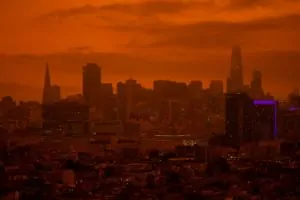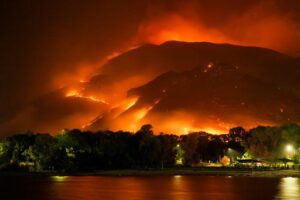I am pretty sure that if a poll were held today, to determine what percentage of the population was terrified by the prospect of dangerous climate breakdown, the number would be pretty small. Plenty of people would likely say they were concerned, quite a few would probably admit to being seriously worried, but terrified, no, not many. And this is a problem.
In recent years, some within the climate science community, and many outside it, have called out those who have highlighted the colossal threat presented by global heating as peddlers of climate ‘porn’. One eminent climate scientist has even warned that we should avoid using such terms as ‘shocking’, ‘terrifying’ or ‘devastating’ when describing climate breakdown, for fear of inducing ‘denial, paralysis and apathy’.
 This is wrong on so many levels that it is difficult to know where to start. The truth is that we are at the heart of a crisis situation that has the potential to tear apart global society and economy within decades. Belittling the dire straits we find ourselves in will do nothing to help us tackle the climate emergency. Instead it will – inevitably – foster the idea that things aren’t actually too bad. So, it might get a bit hotter, and the weather might be a little wilder, but nothing we can’t cope with. This is, of course, completely untrue. Our once stable climate is rapidly disintegrating, and no one will be insulated from the mayhem this will bring in the decades ahead.
This is wrong on so many levels that it is difficult to know where to start. The truth is that we are at the heart of a crisis situation that has the potential to tear apart global society and economy within decades. Belittling the dire straits we find ourselves in will do nothing to help us tackle the climate emergency. Instead it will – inevitably – foster the idea that things aren’t actually too bad. So, it might get a bit hotter, and the weather might be a little wilder, but nothing we can’t cope with. This is, of course, completely untrue. Our once stable climate is rapidly disintegrating, and no one will be insulated from the mayhem this will bring in the decades ahead.
It is now practically impossible to keep this side of the 1.5°C dangerous climate change guardrail, but if we are to have any chance at all of reining in runaway heating, we need drastic action now, today. And the only way we are going to get it, is if the scales can be made to fall from people’s eyes so that the awful future that their children will grow old in and their grandchildren grow up in, is revealed to them. For this to happen, climate scientists need to tell it like it is – uncut and uncensored.
We need, in other words, to strike terror. Fear may, in certain circumstances, paralyse, but more often it drives action. Today, we only have to look at the response of the Ukrainian people to the Russian invasion, for confirmation of this. Fear makes adrenaline levels surge, which in turn actuates an innate and irrepressible urge to fight. And never have we needed such a compulsion as much as we do today. Telling it like it is not being alarmist, far from it. Indeed, whether it is possible, any longer, to paint a picture that is bleaker than the coming reality, is a moot point.
The fact is, if we want to see entire populations rise up and demand serious action, which is what we need – and soon – then we need everyone to be scared, really scared, not slightly concerned. As philosopher and climate activist, Rupert Read, wrote to me recently, ‘grim is good’. As Read stresses in his forthcoming book, Why Climate Breakdown Matters, we are not spectators watching climate catastrophe unfold, we are agents. We have the ability and opportunity to engage, to make a difference, but this will only happen if enough people understand the magnitude of the problem, and are scared enough to act. This will never, however, be the case as long as climate scientists, and those who work on the impacts of climate breakdown, tip-toe around the issue and rein in their language. In many ways, doing so, is only marginally better than denying the existence of global heating, acting as it does to appease concerns for the impacts of climate breakdown in the decades ahead.
 Let’s not beat about the bush here, climate breakdown is a catastrophe. Soon, it will be all pervasive, affecting everyone on the planet and insinuating itself into every aspect of our lives. This is well demonstrated by a single statistic: by 2050, an increasing global population will drive the demand for food up by one half, while at the same time, agricultural yields could be down by as much as one third. Discounting all other impacts of global heating, this – in itself – is enough to drive wholesale starvation and widespread civil strife.
Let’s not beat about the bush here, climate breakdown is a catastrophe. Soon, it will be all pervasive, affecting everyone on the planet and insinuating itself into every aspect of our lives. This is well demonstrated by a single statistic: by 2050, an increasing global population will drive the demand for food up by one half, while at the same time, agricultural yields could be down by as much as one third. Discounting all other impacts of global heating, this – in itself – is enough to drive wholesale starvation and widespread civil strife.
So, be scared, be terrified. But don’t let this feed inertia. Embrace your fears and use them to galvanise action. If you feel the need, blockade an oil refinery or glue yourself to a motorway. Even if this isn’t to your taste, there is still plenty you can do. Drive an electric car, or even better use public transport, walk or cycle. Stop flying, switch to a green energy tariff, eat less meat. Spread the word about the climate catastrophe among your family, friends and colleagues, lobby your elected representatives at both local and national level, and use your vote wisely to put in power a government that – when it comes to the climate crisis – actually walks the talk.
Bill McGuire is Professor Emeritus of Geophysical & Climate Hazards at UCL. He was a contributor to the 2012 IPCC SREX Report on climate change and extreme events. His Cool Earth blog can be found on Substack. Bill McGuire’s new book, Hothouse Earth: an Inhabitant’s Guide, is published by Icon Books in August.






